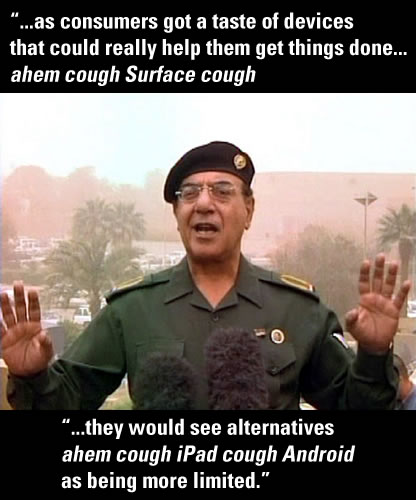Frank X. Shaw

I used to think I had a tough job at Microsoft. I used to half-joke that any fool could evangelize Apple or Google, but it took a special kind of fool to evangelize Microsoft. And among my fellow fools — the Developer and Platform Evangelism team at Microsoft Canada, a smart, great bunch of people with whom I’m still in touch today, to the chagrin of some — I took on the doubly-foolish role of talking to people outside the Microsoft “echo chamber” and in the world of open source and non-Microsofty technologies. I also took on the challenge of being a Windows Phone Champ before and during the Windows Phone 7 launch (remember when it was called “Windows Phone 7 Series”?). If you’d like to know more about how I approached that role, check out my May 24, 2009 article, Evangelist, Immigrant and Shaman.
Tough as that job was, Microsoft’s Frank X. Shaw has a much tougher job than I ever had. My job was to promote just Microsoft’s developer tools and technologies. Even the most ardent of Microsoft-hating developers, if you talk to them long enough, you’ll always end up with some grudging respect for their development tools like Visual Studio, and for the various ways they support their development community. As the head honcho of corporate communications at The Empire, Shaw has to tell the Microsoft story from every angle: not just the developer angle, but the business angle, the shareholder angle, the consumer angle, the tech media angle, and so on. When Vanity Fair published their damning Microsoft’s Lost Decade article that made its way into discussions all over the web, it fell to Shaw to respond. When Windows 8 got compared to New Coke (if you’re too young to remember, it’s what happened when Coke tried messing with their formula in the 1980s), it was Shaw’s job to fire back.
Shaw’s latest challenge is dealing with the fallout from earlier this week, when the following happened:
- the iPad Air announcement totally eclipsed Nokia’s tablet announcement, and
- they announced that the new OS X, Mavericks, as well as the iWork and iLife suite were going to be free-as-in-beer, after which a number of reporters wrote that it would hurt Microsoft.
Shaw came out swinging in a blog post titled Apples and Oranges, defending Surface among other things, but being especially defensive of Office. Among his points:
- “iWork has never gotten much traction, and was already priced like an afterthought, it’s hardly that surprising or significant a move”
- Anything that isn’t Microsoft Office is “non-standard, non-cross-platform, imitation apps that can’t share docs with the rest of the world”
- “As consumers got a taste of devices that could really help them get things done, they would see alternatives as being more limited”
- What Apple is doing is just an “attempt to play catch up”
It’s the standard set of “dismiss, defend, disrupt” tactics that have been Microsoft’s stock in trade since its inception, except that their “disrupt” game hasn’t been all that hot lately, especially in the mobile world. That leaves dismiss and defend as Shaw’s two cards to play, which leaves him using a 21st century version of the old “Nobody ever got fired for buying IBM” game. In playing these cards, he often has to stretch and deal with some unfortunate realities, and as a result often ends up coming off as Microsoft’s answer to the Iraqi Information Minister, a.k.a. “Chemical/Comical Ali” or “Baghdad Bob”.
John Gruber, who’s Shaw’s freelance opposite, hits the nail on the head when he says that while Office is everywhere, it isn’t a standard — at least not in the same way that 110 or 220 volts is a standard, or how TCP/IP, HTTP, and Unicode are standards: de jure standards. Office is a de facto standard that resulted from the Matthew Effect; people use it because other people use it. If you apply Shaw’s “standards” logic to mobile tech, then iOS and Android are standards, and Windows Phone and Windows RT are not.
Let’s also forget that Office is oftentimes the thing we have to use, but don’t want to use. Don’t believe me? Just write an article like Charlie Stross’ Why Microsoft Word Must Die and look at the responses you get.
If you want an amusing take on Apples and Oranges, ITWire has written an amusing version that asks “What if Shaw has written Apples and Oranges in 2007?”. It includes this gem:
Windows and Office ended up reaching every corner of the globe and powering every academic institution, industry and profession. Of course both Windows and Office are evolving all the time – to reflect the way people work today – more file formats, more mobile and connected through the email attachment.
Now we’re doing this with Windows Mobile phone, and you can be certain: the future for Windows Mobile is strong. This iPhone nonsense is, as Steve Ballmer says, something businesses – or most anyone – isn’t going for.
Windows Mobile -OWNS- the business market – heck we’re about to release Windows Mobile 6.5, our best yet – that business and consumer market share isn’t going anywhere, and no-one else is going to be dumb enough to try and compete.
iPhone is a rip-off name too, like iPod was. Windows Mobile ran on an iPaq long before Apple’s iRipoffs landed on the scene.
Oxygen Deprivation

It’s not just the big players who are taking on Microsoft where they live. Smaller players, such as ZOHO, are getting in on the “let’s get Microsoft” game. Their PR department has been sending out an Creative Commons article written by Zoho CEO Sridhar Vembu, who writes this about Microsoft’s problem:
The near-zero revenue share that competitors to Windows had meant that Google and Apple could give away their operating systems (which Apple also announced today!) and not have anything to lose. What Google achieves with the $0 Chrome OS license it charges OEMs (which costs Google exactly $0 in foregone operating system revenue) is that the OEM will now turn around and ask Microsoft for a $0 Windows license.
What OS X, iOS, Android and Chrome OS have collectively achieved is to drive Windows market share to under 25 percent of all client devices, and yet these alternative operating systems derive near zero revenue in and of themselves.
There is really not much Microsoft can do to fight back to stop the erosion of these core franchises. Their traditional weapons — closing the document format, tying the Office suite closer to Windows — none of these weapons work anymore. Today, for the first time in a couple of decades, Microsoft faces serious competition in Office from competitors who, for their own reasons, all want to tear down the monopoly. Why do Apple or Google or Zoho all want to commoditize Microsoft Office? Each company has its own reason: Apple wants to add value to its world-class devices; Google wants to extend the reach of its web services; and for Zoho, the Office suite is one part of our broader work-oriented application suite. As I have argued above, underlying these different strategies is a more fundamental reason: Why not tear down a market where we face a monopoly? Apple would want to stop Microsoft from being able to leverage the Office franchise and money into tablets and smartphones; Google would want to stop Microsoft from being able to pour money into Bing indefinitely and so on. Bill Gates would know what it means to “cut off the oxygen supply” — after all, it was a phrase he invented while finishing off Netscape. Apple and Google recognize, just as we do at Zoho, that the $12+ billion in oxygen (aka operating income) that Microsoft Office contributes to the mothership is now extremely vulnerable.
The Windows and Office monopolies have massively incentivized the broader ecosystem to come up with business models that drive down the value of those core Microsoft franchises to near zero. This is the price Microsoft has paid with its profoundly anti-competitive tactics of the 90s; every single player in the ecosystem, from their once-slavishly-loyal OEMs to would-be competitors, all want to see their market shrunk to zero. Microsoft has punished itself more than the Justice Department could ever have done.